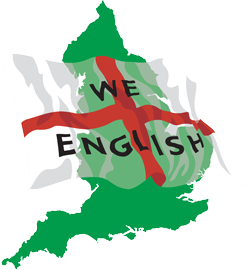An overnight stay in Moreton-in-Marsh this week gave us an opportunity to take in the John Davies Gallery (no relation to the photographer), which specializes in post-Impressionist and contemporary art. They were in the midst of hanging a new show by the artist William Selby, however, they also had a permanent collection of paintings on display. One painting that stood out was ‘Fair at Cromer’ by Robert Duckworth Greenham (1906 – 1975).Â
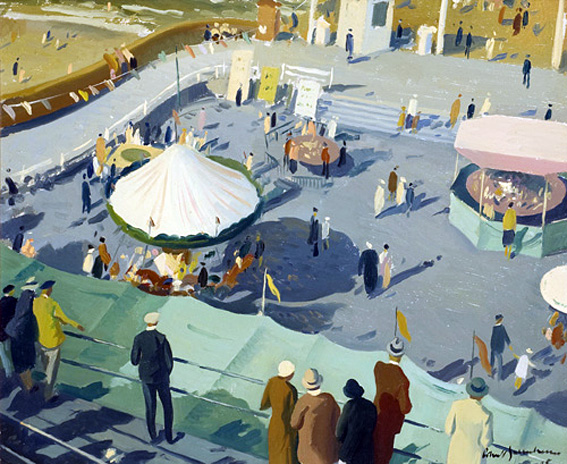
Greenham was a painter and print maker who studied at Byam Shaw School and at the Royal Academy Schools. He was especially fond of painting beach scenes, his slightly stylised draughtmanship and unique palette being instantly recognisable. His brother was the artist Peter Greenham.
Posted in INSPIRATION | Comments Off on FAIR AT CROMER
We’re currently in the Malvern Hills, marketed by the local council as ‘Elgar Country’. According to Brian Micklethwaite, writing on the Icons of England website “The Malvern Hills epitomise England’s ‘green and pleasant land’. They are not an icon solely devoted to London but represent all England, especially when associated with the quintessentially English music of Sir Edward Elgar.â€
We were in Malvern visiting some old friends of ours, Margarette Rolle and her partner Vassily Savenko. Margarette is the promoter of the Boyan Ensemble of Kiev (I spent a month on tour with the Ensemble in 1997 producing one of my first photo essays after graduating). Vassily is an acclaimed bass baritone.
During our stay I spotted a poster in a local shop window advertising a sponsored walk across the Malvern Hills in aid of St. Richard’s Hospice. I went along this morning to watch as a few hundred people walked across this stunning landscape to raise money for the hospice, which cares for patients and families in Worcestershire who are living with cancer and other life-threatening illnesses. As Judy Hughes, one of the walkers I met, said to me “In my opinion spending your leisure time helping others is one of the most rewarding and enjoyable things to do”.
It’s only right to leave you with a link to the Malvern Hills and Elgar.
Posted in EVENTS & PASTIMES | Comments Off on ELGAR COUNTRY
I need to thank three institutions for their kind financial support, which is helping to make the production of We English possible.
Firstly, I recently received a bursary from the National Media Museum in Bradford. Greg Hobson, Curator of Photographs at the Museum describes the bursary as “part of the Museum’s ongoing commitment to photography and to increase awareness of contemporary photography by promoting the work of emerging photographers. The bursaries will help talented photographers produce ongoing projects or a new body of work, allowing them to develop and enhance their practice and profile.†The bursary was judged by a group of key individuals involved in contemporary art: Michael G Wilson (Chairman of the Trustees of the National Media Museum), Zelda Cheatle (WMG Photography Advisor and Curator), Simon Crocker (Chairman of The John Kobal Foundation), Philippe Garner (International Head of Photography, Christie’s Auction House) and Terence Pepper (Curator of Photographs, National Portrait Gallery).
Secondly, Arts Council England for awarding me with an ‘Individual Grant for the Arts’.
And finally to the John Kobal Foundation and their Chairman, Simon Crocker, who have also committed some funds to the project.
Posted in TRIP LOGISTICS | Comments Off on FUNDING
“Welcome to our beautiful town, Chipping Campden in the Cotswolds. Campden is one of the most beautiful tourist destinations in the UK. Take a pictorial tour and get a taste of Olde Cotswold England – but if you really want to appreciate the feeling of staying in an old cotswold stone house in a town, hardly touched by the centuries, you’ll just have to come and visit us.” from www.chippingcampden.co.uk Â
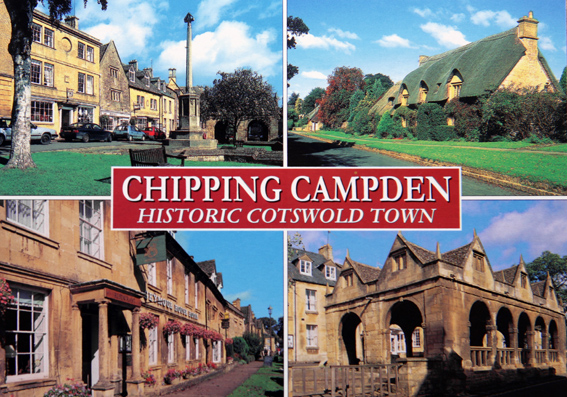
This is one of the only places I’ve come across that actually looks like the postcard. Chipping Campden is eerily picturesque, in a manicured, clipped and tidy way. With so much talk in the media about what it means to be English and about notions of community, identity and stereotypes, it was quite strange to visit a town that felt pathologically, quintessentially English.Â
Posted in POSTCARDS | Comments Off on WELCOME TO OUR BEAUTIFUL TOWN
The 5×4 is proving popular with the public. People come up to me most days when I’m working to ask about the camera. Here’s one elderly gentleman taking a look at my composition.
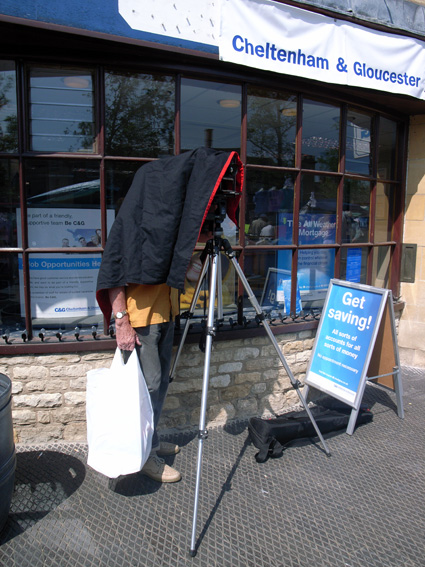
Posted in ON THE JOB | Comments Off on CAN I LOOK AT YOUR CAMERA?
Jemima relaxing at basecamp in Cirencester. Long may this weather continue!
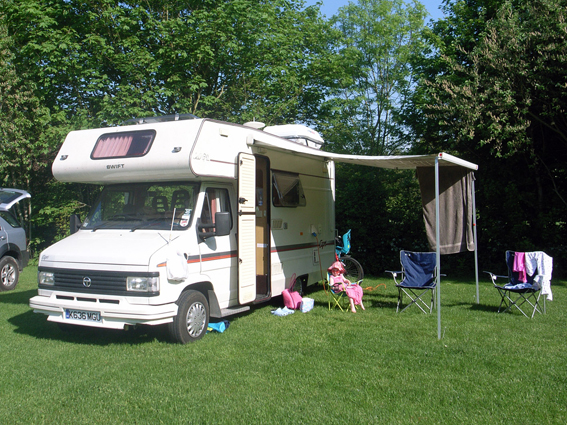
Posted in TRIP LOGISTICS | Comments Off on BASECAMP
Today I was photographing at the Cotswold Water Park, a 40 square mile wetland area south of Cirencester. The Water Park is the catchment area of the Upper Thames. Back in 1967, it was designated the Cotswold Water Park by a Joint Committee formed from the four local authorities – Gloucestershire & Wiltshire County Councils, and Cotswold & North Wilts District Councils. Many of the lakes are flooded gravel excavation pits. Gravel extraction began in the area over 50 years ago. Because the water table is so high, the first quarries were dug wet; today, however, quarries are de-watered. When extraction is complete, all pumps are switched off and the holes fill naturally with water. There are 140 lakes in the park, controlled by 40 different owners, many of whom use their lakes almost entirely as private property, private clubs or for private developments.
I spent most of the day photographing at the Keynes Country Park with its large beach area and lush green wooded backdrop. The lake was packed with families and groups of friends enjoying the May sunshine. The scene reminded me of a photograph I’d taken in Yekaterinburg for my book on Russia, Motherland (also taken in May).

Victory Day Picnic, Yekaterinburg, May 2005
Interestingly enough, having photographed a family barbequeing on the edge of the woodland, I discovered they were actually from Slovakia. Dusen and his wife have lived in Stroud for the past three years where they work as vets. When I asked them about their future plans they told me they’d be returning to Slovakia because they wanted to bring up their children in their ‘homeland’. This sense of belonging echoed the relationship that many Russian’s feel for their ‘motherland’ or rodina in Russian.
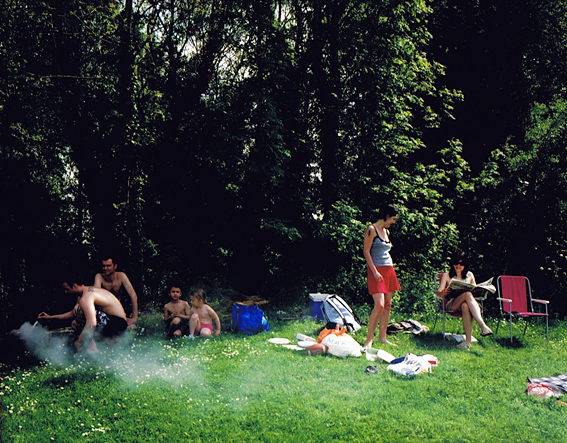
Dusen and his family, Keynes Country Park
Rosamund Bartlett, who wrote the introduction to my book, described the idea of the rodina as such-
“Rodina might just about be the most emotive word in the Russian language. The fact that it is also impossible to translate adequately says something about its close relationship to questions of national destiny, the Russian sense of self and the enduring belief in the country’s messianic future. The Russian motherland is something apart. ‘Every nation has a motherland,’ wrote the religious philosopher Georgy Fedotov in 1915, ‘but only we have Russia.’ The deepest source of patriotism in Russia accordingly lies not in pride in national achievements or military glory, but in love for the motherland, whose most visible expression is the extraordinary, almost physical attachment which Russians have for their native landscape – an attachment which they are often at a loss to fathom.”
This sense of belonging and attachment to a physical place is one of the motivations for my England journey. I suppose in some ways I’m on a quest to discover what my own homeland means to me.
Posted in ENGLISHNESS, ON THE JOB | Comments Off on HOMELAND
There’s an interesting feature in today’s Independent on Sunday Review on the secret resurgence of Morris dancing!
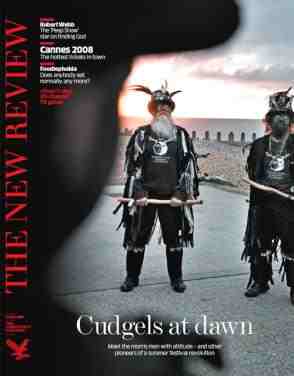
You can read “Hey nonny no, no, no: Goths and pagans are reinventing morris dancing” by Cole Moreton here. Photographs are by Tom Pilston. The article also features the Long Men Morris who I photographed on May 1st – see my blog entry below.Â
Â
Posted in EVENTS & PASTIMES | Comments Off on MORRIS MEN
It seems that the PR company charged with promoting the new edition of the Rough Guide to England have been peddling the headline grabbing quote “The English are overweight, binge-drinking reality TV addicts.†It’s certainly been successful given the amount of news coverage it’s got in the past 48 hours.
Apparently the Rough Guide accuses the English of being quarrelsome, contradictory and “obsessed with toffs and C-list celebritiesâ€Â and labelling English people as “insular, self-important and irritating”. It goes on to say that political debate on issues such as immigration, Islamic terrorism and street crime is “served up with liberal dollops of celebrity chit-chat. Even the world’s most remote communities are on first-name terms with its princes, footballers and pop stars.”
However, the guide also pays the country some veiled compliments. For example, England is “a country of animal-loving, tea-drinking, charity donors, where queuing remains a national pastime and bastions of civilisation, like Radio 4, are jealously protectedâ€. They conclude that “Of the 200-plus destinations across the world that Rough Guides covers, there is none so fascinating, beautiful and culturally diverse, yet as insular, self-important and irritating, as England.â€
According to The Independent, the guide offers some less-than-complimentary opinions on some of the country’s towns and cities. It describes Blackpool, arguably one of Britain’s premiere seaside resorts, as “shamelessly brash”. Derby is “unexciting”, Plymouth is “bland” and, as for the English Riviera, Torquay, “St Tropez it ain’t” is The Rough Guide’s unforgiving verdict.
Â
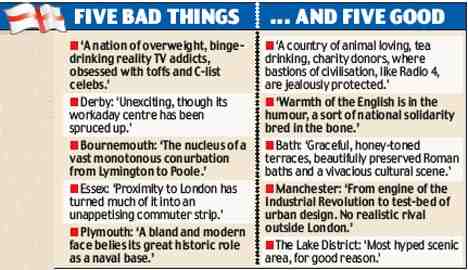
Given current suspicion towards travel guide writers, I wonder if those involved in writing this edition actually visited England!
It’s certainly got some local people riled. Here are some comments in the Gloucestershire Echo. I’ll let you know if I agree as we’re off to Gloucestershire later this week.
Posted in ENGLISHNESS | Comments Off on ROUGH GUIDE TO ENGLAND
I’ve just started reading H.V.Morton’s classic travel book In Search of England, an enduring account of Morton’s ramblings through the English countryside in the early days of the motorcar which was first published in 1927. Like Morton, we’ve begun our journey heading West from London.Â
This past week has seen us travelling through Berkshire and Wiltshire. We’re currently in the historic Roman town of Cirencester having just photographed the Swindon Kite Festival in Lydiard Park (somewhat spoiled by a distinct lack of wind!) and Cheltenham vs Eton at Cirencester Polo Club.
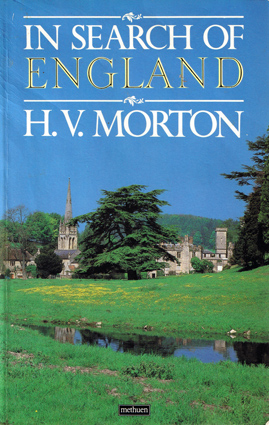
“It is afternoon. It has stopped raining, and the sun has come out; so has the entire country. Those lonely mansions set upon a hill, or lying snug in woods, which six days out of seven appear dead, prove to be inhabited by colonels, majors, Sir Alfred This and Lord That. It is a startling coming-to-life. The recently desolate roads are alive with limousines- luncheon baskets on top, the girls inside, and the major driving.”
This passage, where Morton visits a Point-to-Point hunt near Beaulieu, could easily be used to describe the scene I found today at Cirencester Polo Club. The match was held in the grounds of Lord and Lady Bathurst’s estate (which has been in the family since 1695 when it was purchased by Sir Benjamin Bathurst). I was given permission to attend and photograph the event by Major Nicholas Musgrave, Chairman of the polo club (and whose daughter, Arabella, was Prince William’s first girlfriend, whom he dated before university), on the proviso that I was “legit and had no intention of doing a hatchet jobâ€.
The polo was taken very seriously and the skill of the young riders was obvious even to a novice. It was slightly embarrassing having to park our motorhome next to an Aston Martin DB7 and we certainly hadn’t brought our Fortnum and Mason hamper, which seemed to be de rigor.
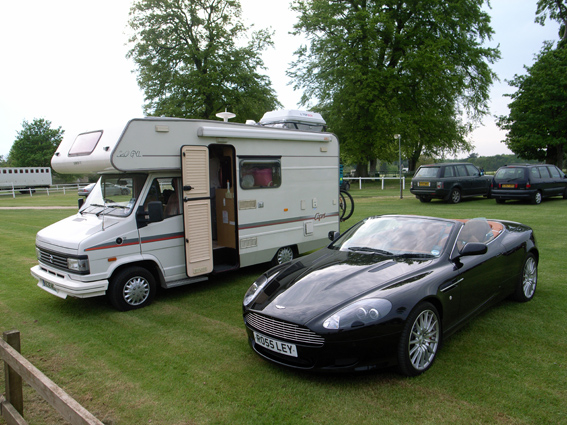 Â
Â
Only a few hours earlier we had been in the grounds of Lydiard Park in Swindon. People were gathered there in much the same way as they congregated at the polo match: arriving in their cars with friends, bringing food and drink, wearing their preferred summer clothes. Sartorial codes differed however: in Swindon, the males were topless, tattooed and wearing shorts, in Cirencester, the favoured look was blue shirts and khaki slacks. One group played polo, the other played football; one group drank lager, the other praised the quality of the champagne. This is England’s class system at its most pointed, but it also demonstrates that whatever differences class and money might make, people still inhabit and utilise their immediate environments in much the same way. Our rituals, pastimes and mode of discourse are, in some senses, quite uniform as we respond to the call of a sunny day and the freedom of green, open spaces.
By the way, I wonder which mode of transport Morton would have opted for if he was making his journey around England today- Talbot Swift motorhome or Aston Martin DB7?
Posted in EVENTS & PASTIMES | 1 Comment »
